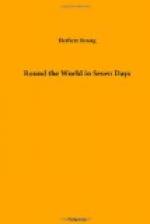Here was Philippopolis, with its citadel perched on a frowning rock. It seemed but a few minutes when Adrianople came into view, and but a few more when, descending to within five hundred feet of the ground, they raced over the plains of St. Stefano. Now Rodier checked the speed a little, and steering past the large monument erected to the memory of the Russians who fell in ’78, came within sight of Constantinople. Smith was bewildered at the multitude of domes, minarets, and white roofs before him. It would soon be necessary to choose a landing-place, and Rodier planed upwards, so that he could scan the whole neighbourhood in one comprehensive glance.
“Slow down!” Smith shouted.
There was a large open space below him; it was the Hippodrome. He made a quick calculation of its length, and decided not to alight. A little farther on he came to the Ministry of War with its large square; but there a regiment of soldiers was drilling. Rodier steered a point to the north-west, and the aeroplane passed over the Galata bridge that spans the Golden Horn. The bridge was thronged with people, who, as they caught sight of the strange machine flying over their heads, stood and craned their necks, and the airmen heard their shouts of amazement. To the right they saw, beyond the hill of Pera, a stretch of low open country. Passing the second bridge over the Horn, they came to a broad green space just without the city. It was the old archery grounds of the Sultans.
“Dive, Roddy!” Smith cried.
Rodier jerked the lever back: the humming clatter of the engine ceased; and the aeroplane swooped down as gracefully as a bird, alighting gently on the green sward.
CHAPTER IV
A FLYING VISIT
It was Friday morning. Groups of Turkish women, out for the day, hastily veiled their faces and ran away, shrieking, “Aman! Aman! oh dear! oh dear!” Swarms of children, clustering, like ants, about nougat-sellers, fled in terror, screaming that it was the devil’s carriage, and the devil was in it. Two Greek teams playing at football stopped their game and gazed open-mouthed; young naval cadets at leapfrog rushed with shouts of excitement towards the aeroplane; and a crowd of Jewish factory girls (for all races and classes use this common playground), realizing with quick wit what it meant, flocked up with shrill cries: “C’est un aviateur: allons voir!” A grave old Turk mutters: “Another mad Englishman!” A Greek shouts: “Come on, Pericles, and have a look”; and suddenly, amid the babel of unknown tongues Smith hears an unmistakable English voice: “Oh, confound it all, Crawford, I’m in the ravine.”
Peering through the crowd of inquisitive faces, Smith sees two golfers and hails them heartily. They elbow their way through, and Smith, who has not yet dared to leave the machine lest the mob should invade it and do it an injury, steps out and grasps the hand of a fellow Englishman.




